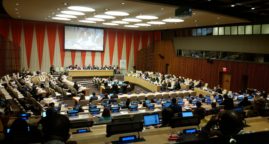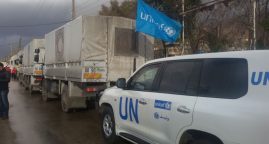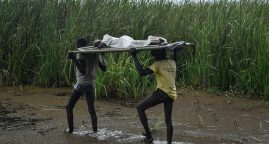A humanitarian’s guide to choosing the next UN chief
Of the nine candidates currently in the running to become the next UN secretary-general, who will bring the most expertise, creativity and focus to the humanitarian agenda?
The selection of the world’s top civil servant has traditionally happened behind closed doors, but last week, for the first time ever, candidates presented their visions for the UN to the General Assembly in New York and took questions from governments, civil society and journalists in public events.
In typical UN speak, they waxed lyrical on a long list of topics: peace and security, sustainable development, human rights, humanitarian response, “leaving no one behind”, preventing disasters before they happen, securing the survival and long-term future of refugees, acting on climate change, bringing gender equity and other reforms to the UN, strengthening regional relationships, cracking down on sexual abuse by peacekeepers, and focusing on youth.
Most were not very specific in their standpoints on key humanitarian issues. But here’s what we could draw out of their vision statements, the “informal dialogues” held at the UN, the press conferences and an open debate held among some of the candidates in New York. Scroll down for our reading of the candidates’ odds – and how they compare with those of the bookmakers!
Prevention of conflict
This was one of the most common themes running through candidates’ visions; many referred to the joint imperatives of finding political solutions to conflict and addressing its root causes. Bulgarian Irina Bokova, currently head of UNESCO, the UN agency for science, education and culture, framed it as “the core task” of the organisation, requiring a new investment and focus in mediation and prevention, as well as enhanced monitoring. In her statement, she called for the prevention of conflict and violence through political solutions and diplomacy and by strengthening “societies today to make them resilient to all threats to peace – from violent extremism to intolerance, discrimination and conflict”. Like another Eastern European candidate, former Moldovan foreign minister Natalia Gherman, she stressed the importance of early warning mechanisms.
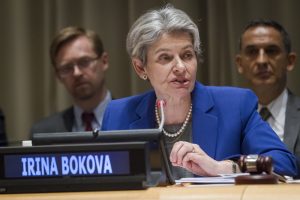
Irina Bokova
Portugal’s António Guterres, former head of the UN’s refugee agency, UNHCR, referred to a “strategic commitment to a culture of prevention” and stressed the importance of finding political solutions to humanitarian crises. He and Croatian politician Vesna Pusić also pointed to addressing extreme inequality and competition over scarce resources as drivers of conflict. “For all the progress that has been made, too many people have been left behind,” Pusić, formerly Croatia’s foreign minister, said. “This is morally wrong but it is also a threat to peace and security.”
Helen Clark, former prime minister of New Zealand and now head of the UN Development Programme, called for a UN better equipped to anticipate world events and share reliable information with those who need it. Danilo Türk, a professor of international law and former president of Slovenia, saw a priority in preventive diplomacy and more meaningful accountability for war crimes. Montenegro’s former prime minister Igor Lukšić called for a “holistic and integrated approach to preventing, mitigating and resolving conflicts”, and Serbian politician and diplomat Vuk Jeremić suggested the creation of an Interagency Task Force on the Prevention of Genocide and Other Mass Atrocities for more coordinated and effective prevention across the UN system.
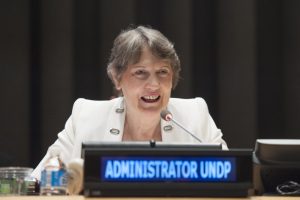
Helen Clark
Less tunnel vision
Another common theme was the importance of a cohesive UN approach that recognises the linkages between sustainable development, peace and security, human rights and humanitarian relief. Most candidates spoke of the need to move away from compartmentalised responses. “Working in silos cannot go on,” Bokova said. At the UN informal dialogue, she called for deeper awareness of “why peace and security and development are so closely linked”. Gherman called for enhanced coordination between the humanitarian and development communities. Clark pointed to a need for “seamless links” and “strong partnerships”. In her vision statement, she said the UN system delivers best when “it recognises and responds to the fundamental connection between sustainable development, peace and security, and human rights”. Guterres called for humanitarian and development actors not only to bridge the gap between them, but to “work together from the very beginning of the crisis, ideally contributing to preventing it”. He spoke of the need to “connect the dots” and “strengthen the nexus between peace and security, sustainable development and human rights policies”.
Displacement crisis
While the unprecedented number of people displaced in the world featured highly in most of the candidates’ priorities, Guterres clearly had an upper hand on this subject. “Migration”, he said, “should be an option, not a necessity; out of hope, not despair.” He called for more legal opportunities for migration and combatting smugglers and traffickers. He also said middle-income, refugee-hosting states should be a priority for development cooperation and UN agency support. Lukšić criticised the controversial deal between Turkey and the European Union to tackle refugee flows as an example of weak UN leadership. Bokova called on the UN to play a greater role in addressing the crisis through improved access to education, health and security. Gherman suggested better protection mechanisms and durable solutions for internally displaced people, noting the need for “a medium- and long-term resilience and development perspective”. She said migration had to become a “win-win” situation for both host countries and migrants, and that recipient countries had to become more resilient to better handle influxes. Macedonian economist Srgjan Kerim said migration would be a top priority not because of the current crisis but because “the whole history of mankind is about migration.”
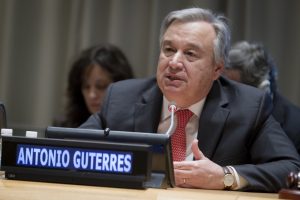
António Guterres
Clark called for urgent support for adaptation and building resilience to climate change. Bokova said the “unfinished business” of the Millennium Development Goals (has anyone told her they’ve already been replaced?) should have a special focus on the world’s Least Developed Countries and those most vulnerable to the impact of climate change. Kerim said the UN must be the driving force in bringing global warming under control and that the special needs of those threatened most by climate change – Least Developed Countries, landlocked developing countries, and small island states – must be high on the secretary-general’s agenda.
Protection of civilians
Jeremić was perhaps the strongest on this file, calling for more robust rules of UN engagement for peacekeeping and stabilisation missions. Most candidates also referred to the sexual abuse of civilians by peacekeepers and called for a “no tolerance” approach.
Humanitarian principles
Pusić and Guterres were the only candidates to refer specifically to a need for more respect for humanitarian principles and the “autonomy of humanitarian space” in their vision statements. Pusić highlighted the fact that many terrorist groups like the so-called Islamic State, al-Qaeda and the Taliban “treat the humanitarian agencies as if they were the enemy. Indeed, part of their strategy is to ensure that no help gets to civilians in areas where they operate”. She flagged in particular the fact that humanitarian agencies may not want to be associated with the UN, which “is itself not neutral in these conflicts”.
Localisation
The importance of localising humanitarian response has been a focus of the discussions in the lead-up to the upcoming World Humanitarian Summit. Many candidates referred to the need to work more closely with regional organisations, particularly the African Union. Guterres called for strengthening the ability of governments to address the needs of their people through capacity and institution building; while Türk said one of his priorities would be developing a greater understanding and acceptance of different cultures and their diversity. Gherman said the new secretary-general must “ensure connectivity between the global and regional levels, facilitating the efforts of all relevant actors”. Lukšić proposed that the seat of the UN deputy secretary-general be based in Nairobi.
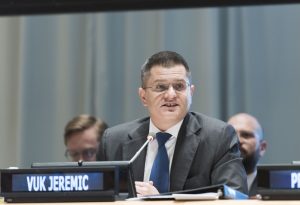
Vuk Jeremić
Many candidates cited the problem of funding shortfalls for humanitarian assistance but few offered concrete solutions. Jeremić was perhaps most creative in this regard, calling for a special envoy tasked with mobilising resources to address the shortfalls, with an emphasis on the Middle Eastern and African refugee crises as well as disaster relief (this already exists to some extent in the appointment of Russian diplomat and UN official Rashid Khalikov as UN assistant secretary-general for “humanitarian partnerships”). This would help to improve coordination of humanitarian relief, support, and assistance to refugees, Jeremić said. Guterres called for strengthening partnerships with international financial institutions, while Bokova and Gherman called for “innovative approaches” and more “adequate and predictable” financing, respectively, without specifying how. While Türk welcomed increasing funds for humanitarian purposes, he said this mustn’t take place at the expense of “economic and social development”. Pusić called for middle-income countries to give more to humanitarian efforts, saying their pooled resources would add up.
UN effectiveness
This was a big topic across all the candidates’ visions. Clark and Guterres, who have both led large UN agencies, said the UN needed to undergo substantial reform to be more “fit for purpose”: more results-driven, less process-focused, more flexible and innovative. Clark said she wanted to see a more transparent UN that is frank about what it cannot do; with a better reputation in the field. Bokova called for more people-centred approaches. Türk went further, saying the UN needed “a strong moral commitment to its original purposes and objectives”. Gherman and Türk spoke of zero-tolerance policies towards fraud and corruption. Jeremić called for a strengthened Office of Internal Oversight Services, protection for internal whistleblowers, mandatory financial disclosures, and a transparent UN budget overview. Many candidates called for more effective and flexible employment procedures that would allow the UN to more quickly recruit talented staff or remove underperforming officials. Lukšić called for consolidating a fragmented administrative structure, and a deep budget review.
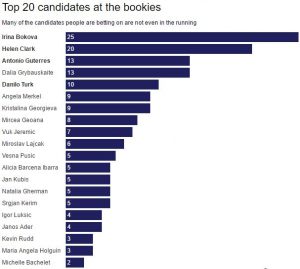
Who will be the next secretary-general?
The field is still wide open, with plenty of new names swirling around and many more candidates likely to enter the race. Thanks in part to the 1 for 7 Billion campaign, campaigning for the top diplomatic job is – for the first time in UN history – mostly public, even if the final decision is ultimately made by General Assembly, upon the recommendation of the Security Council.
Of the nine candidates currently in the running, UN insiders and others close to the process see UNESCO head Irina Bokova, UNDP Administrator Helen Clark, former High Commissioner for Refugees António Guterres and former Slovenian President Danilo Türk as the frontrunners (if the bookmakers are anything to go by, some of the top contenders have yet to formally present themselves, including Lithuanian President Dalia Grybauskaitė). Some see Croatian Vesna Pusić– a strong supporter of LGBT rights – as an emerging favourite, with a strong showing as an independent yet pragmatic leader at the UN informal dialogues and “meet the candidates” public event in New York last week.
Russia, which holds a veto at the Security Council, insists that Eastern Europe finally has its turn at the top diplomatic job. With a group of 56 states, supported by the US, pushing for the first woman secretary-general, a woman from Eastern Europe would tick both boxes. But observers have expressed doubt over the strength of the current contenders and the Security Council will have a hard time ignoring a candidate with the right blend of charisma, diplomacy, and leadership, not to mention strong public support. That said, blandness is a surprisingly important trait in a UN secretary-general. As Jean-Marie Ghéhenno, president of the International Crisis Group, put it: The hearings “may reveal incompetence but candidates will show strength of character at their own risk”.
Among the two Eastern European women, controversy is already swirling around Bokova, the frontrunner: reports accuse her of cronyism and falsifying an aspect of her CV, and question the source of her personal wealth. Her reported close ties to Russian President Vladimir Putin and membership of Bulgaria’s Communist Party have also raised eyebrows.
Others are hopeful that another Bulgarian, Kristalina Georgieva, a vice-president of the European Commission, will enter the race. Bokova edged her out for her country’s nomination, but other countries are entitled to put her name forward. An economist, she comes with significant credentials: as European commissioner for humanitarian aid, she was in charge of the EU’s aid arm ECHO, the world’s largest humanitarian donor; is currently in charge of the European Commission’s budget department; and recently chaired a high-level panel on humanitarian finance for the current secretary-general.
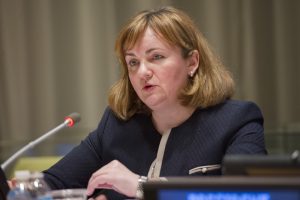
Natalia Gherman
But whether Russia would back Eastern European candidates who are pro-NATO and pro-EU, including the two other women candidates, Pusić and the soft-spoken Moldovan, Natalia Gherman, remains to be seen. Some observers said Russia would rather elect someone from another region than a pro-democracy, pro-Western Eastern European, while others said any Eastern European would be more acceptable than none at all.
The entry of Clark, the highly experienced former prime minister of New Zealand, will be a signal for some that women from regions other than Eastern Europe may have a chance. Chilean President Michelle Bachelet’s name has been bandied about; and speculation about German Chancellor Angela Merkel as a potential candidate has also persisted since she has yet to rule out running for the job.
Clark is a strong contender, credited with standing up to big powers and having good relations with China. In the event of a deadlock she could well be a compromise candidate, and would most likely get support from the UK and the US. As UNDP administrator, she is considered the third most powerful person in the UN after the secretary-general and his deputy, but her leadership of the UNDP has not been faultless. Its budget has been whittled down by one third under her watch. Some point to the landmark Petrie Report, an internal review of the UN’s failure to protect civilians in the bloody civil war in Sri Lanka, which reflected badly on the most senior UN official in Sri Lanka, who reported directly to Clark.
Many insiders see Guterres, with his strong personality, passion and experience at the frontlines of so many crises around the world, as the perfect contender for the top job – were he not a man, and from Portugal. He is also used to giving orders, not taking them, and as such seen by some to be too independent, politically left-leaning and strong-willed to do the bidding of the Security Council. But he too stands a chance of landing the job as a compromise candidate in the event of a deadlock.
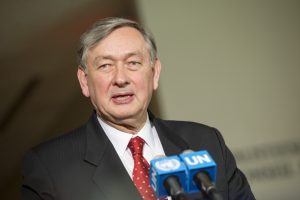
Danilo Türk
Of the four Eastern European men in the race – Türk, 64, Igor Lukšić, 39, Srgjan Kerim, 67, and Vuk Jeremić, 40 – the statuesque Türk is seen as the most likely contender, with much experience and a solid track record in the UN and the Security Council. But he is perceived to be too bureaucratic and cautious, and not popular enough with either Russia or the US to actually get the nod. Lukšić, the youngest candidate so far, showed dynamism and force of personality at both the UN informal dialogue and the “meet the candidate” event, but few see him as a “first tier” candidate.
Jeremić, the forceful Serbian foreign minister who spoke with tremendous confidence at the UN hearings, is not a favorite of the West and is unlikely to get far in his pursuit, pundits say. An ardent Serbian nationalist who lobbied hard against the recognition of Kosovo’s independence, Jeremić was reportedly “extremely divisive” in his role as president of the General Assembly and made a few enemies when he reportedly sang a nationalist Serbian song at a UN function, according to one insider.
Article published on IRIN website
Related Articles
Malteser International gains Special Consultative status to the United Nations Economic and Social Council
06/07/2018. “This is a landmark achievement for us and our work for the most vulnerable people of this world”
The problem with aid convoys
10/03/2016. It’s time to ask some hard questions about how assistance is being delivered in Syria, and if it’s really helping that much at all.
Local aid agencies: still waiting for a bigger share of the funding cake
03/27/2017. Donors and UN agencies who agreed to provide at least one quarter of humanitarian aid funding “as directly as possible” to local NGOs are struggling to deliver on their pledge.


